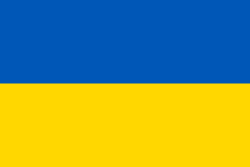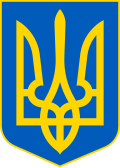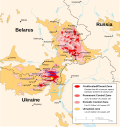Portal:Ukraine
The Ukraine Portal - Портал України
Ukraine Україна (Ukrainian) | |
|---|---|
| ISO 3166 code | UA |
Ukraine is a country in Eastern Europe. It is the second-largest country in Europe after Russia, which borders it to the east and northeast. Ukraine also borders Belarus to the north; Poland and Slovakia to the west; Hungary, Romania and Moldova to the southwest; and the Black Sea and the Sea of Azov to the south and southeast. Kyiv is the nation's capital and largest city, followed by Kharkiv, Dnipro, and Odesa. Ukraine's official language is Ukrainian.
Humans have inhabited Ukraine since 32,000 BC. During the Middle Ages, it was the site of early Slavic expansion and later became a key centre of East Slavic culture under the state of Kievan Rus', which emerged in the 9th century. Kievan Rus' became the largest and most powerful realm in Europe in the 10th and 11th centuries, but gradually disintegrated into rival regional powers before being destroyed by the Mongols in the 13th century. For the next 600 years the area was contested, divided, and ruled by a variety of external powers including the Grand Duchy of Lithuania, the Kingdom of Poland, the Polish–Lithuanian Commonwealth, the Austrian Empire, the Ottoman Empire, and the Tsardom of Russia.
The Cossack Hetmanate emerged in central Ukraine in the 17th century but was partitioned between Russia and Poland before being absorbed by the Russian Empire in the late 19th century. Ukrainian nationalism developed and, following the Russian Revolution in 1917, the short-lived Ukrainian People's Republic was formed. The Bolsheviks consolidated control over much of the former empire and established the Ukrainian Soviet Socialist Republic, which became a constituent republic of the Soviet Union in 1922. In the early 1930s, millions of Ukrainians died in the Holodomor, a human-made famine. During World War II, Ukraine was occupied by Germany and endured major battles and atrocities, resulting in 7 million civilians killed, including most Ukrainian Jews.
Ukraine gained independence in 1991 as the Soviet Union dissolved and declared itself neutral. A new constitution was adopted in 1996 as the country transitioned to a free market liberal democracy amid endemic corruption and a legacy of state control. The Orange Revolution of 2004–2005 ushered electoral and constitutional reforms. Resurgent political crises prompted a series of mass demonstrations in 2014 known as the Euromaidan, leading to a revolution, at the end of which Russia unilaterally occupied and annexed Ukraine's Crimean Peninsula, and pro-Russian unrest culminated in a war in Donbas with Russian-backed separatists and Russia. Russia launched a full-scale invasion of Ukraine in 2022. (Full article...)
In the news
- 16 April 2025 – Russian invasion of Ukraine
- Kherson strikes
- Russian artillery and glide bombs target Kherson, Ukraine, killing one person and injuring nine others. A sports facility, a supermarket, and residential buildings were among those hit. (AP)
- Dnipro strikes
- A large-scale drone attack on Dnipro, Dnipropetrovsk Oblast, kills two people and injures 16 others. (Reuters)
- 15 April 2025 – Russian invasion of Ukraine
- 2025 Sumy airstrike
- Ukrainian military leader Volodymyr Artyukh is fired from his position as Sumy Oblast Governor following condemnation for organizing a military ceremony in the densely populated Sumy city center, which was later targeted by a Russian airstrike. (The Kyiv Independent)
- 14 April 2025 – Russian invasion of Ukraine
- United Kingdom and the Russian invasion of Ukraine
- The United Kingdom sends £752 million ($990 million) to Ukraine for the purchase of surface-to-air missiles, artillery and spare parts for fighter aircraft, as part of an international loan programme funded primarily through seized Russian financial assets. (Reuters)
- 13 April 2025 – Russian invasion of Ukraine
- Attacks on civilians in the Russian invasion of Ukraine
- 2025 Sumy airstrike
Featured pictures
Did you know (auto-generated)

- ... that Ivan Petrovtsii's vulgar poems were condemned by senior Ukrainian officials in spite of their popularity?
- ... that one of Ukraine's largest power plants was mostly destroyed by Russians in March 2024?
- ... that Jenya Kazbekova, a competition climber on Ukraine's 2024 Olympic team, is the daughter and granddaughter of competition climbing medalists?
- ... that the Ukrainian composer Borys Lyatoshynsky composed his second opera, Shchors in 1937–38, about a military figure from Ukraine who fought for the Soviet Red Army in the Ukrainian–Soviet War?
- ... that in March 2022 Sonja van den Ende was the only Dutch journalist to report from the Russian-occupied Donbas on the war in Ukraine?
- ... that 1920s belles-lettres books published by the State Publishing House of Ukraine sold out more rapidly than similar books published elsewhere in the Soviet Union, despite the higher average price?
More did you know -
- ... that the Kryvbas economic region in Ukraine is one of the largest iron ore and steel industry centers in Europe?
- ... that journalist Savik Shuster who used to work for Russian TV channels now prefers to work for the Ukrainian TV because he felt the Russian Government was limiting his journalistic freedom?
- ... that the Privat Group is one of the few Ukrainian companies that own industries in the United States?
- ... that although the secular music of Mykola Leontovych was well known in the twentieth century, the Liturgy of St. John Chrysostom was little known because of a ban on sacred music in the Soviet Union?
- ... that Ukrainian naturalist, lecturer, artist and author John Lhotsky was credited as the first discoverer of gold in New South Wales?
- ... that Vasyl Avramenko is often referred as "The father of the Ukrainian dance"?
Selected article -

The history of Ukraine spans thousands of years, tracing its roots to the Pontic steppe—one of the key centers of the Chalcolithic and Bronze Ages, Indo-European migrations, and early horse domestication. In antiquity, the region was home to the Scythians, followed by the gradual expansion of Slavic tribes. The northern Black Sea coast saw the influence of Greek and Roman colonies, leaving a lasting cultural legacy. Over time, these diverse influences contributed to the development of early political and cultural structures.
Ukraine enters into written history with the establishment of the medieval state of Kievan Rus'. In Dnieper Ukraine, the tribe of Polans played a key role in the formation of the state, adopting the name Rus' by the 9th century. The term is believed to have connections to the Varangians, who contributed to the state’s early political and military structure. By the 10th–11th centuries, Kievan Rus' had grown into one of the most powerful and culturally advanced states in Europe, reaching its golden age under Volodymyr the Great and Yaroslav the Wise, who introduced Christianity and strengthened political institutions. However, internal conflicts among Kyivan rulers, along with increasing pressure from Turkic nomads in Southern Ukraine, gradually weakened the state. In the 13th century, Kievan Rus' suffered devastating destruction during the Mongol invasion, particularly in its Dnieper heartlands. While much of the former Rus' territory fell under Mongol control, the Kingdom of Ruthenia (Galicia-Volhynia) emerged as its successor, continuing political and cultural traditions under King Daniel. (Full article...)
In the news
- 16 April 2025 – Russian invasion of Ukraine
- Kherson strikes
- Russian artillery and glide bombs target Kherson, Ukraine, killing one person and injuring nine others. A sports facility, a supermarket, and residential buildings were among those hit. (AP)
- Dnipro strikes
- A large-scale drone attack on Dnipro, Dnipropetrovsk Oblast, kills two people and injures 16 others. (Reuters)
- 15 April 2025 – Russian invasion of Ukraine
- 2025 Sumy airstrike
- Ukrainian military leader Volodymyr Artyukh is fired from his position as Sumy Oblast Governor following condemnation for organizing a military ceremony in the densely populated Sumy city center, which was later targeted by a Russian airstrike. (The Kyiv Independent)
- 14 April 2025 – Russian invasion of Ukraine
- United Kingdom and the Russian invasion of Ukraine
- The United Kingdom sends £752 million ($990 million) to Ukraine for the purchase of surface-to-air missiles, artillery and spare parts for fighter aircraft, as part of an international loan programme funded primarily through seized Russian financial assets. (Reuters)
- 13 April 2025 – Russian invasion of Ukraine
- Attacks on civilians in the Russian invasion of Ukraine
- 2025 Sumy airstrike
Selected anniversaries for April

- April 16, 2000 — Ukraine's national referendum takes place on the issue of reformation the governing system of Ukraine.
- April 22, 2006 — Two homemade bombs exploded in different supermarkets in the Ukrainian city of Kharkiv.
- April 26, 1986 — Reactor No. 4 of the Chernobyl Nuclear Power Plant exploded at 01:23 A.M.
- April 29, 1918 — Constitution of the Ukrainian People's Republic, a constitutional document, was approved by the Central Rada, but never announced.
- April 29, 1918 — The Holiday of Ukrainian Sea. On this day the main parts of Black Sea fleet in Sevastopol hoisted ukrainian flags.
Photo gallery
Related portals
Religions in Ukraine
Post Soviet states
Other countries
WikiProjects and collaborations
Associated Wikimedia
The following Wikimedia Foundation sister projects provide more on this subject:
-
Commons
Free media repository -
Wikibooks
Free textbooks and manuals -
Wikidata
Free knowledge base -
Wikinews
Free-content news -
Wikiquote
Collection of quotations -
Wikisource
Free-content library -
Wikiversity
Free learning tools -
Wikivoyage
Free travel guide -
Wiktionary
Dictionary and thesaurus
New articles
Ukrainian editions of Wikimedia projects
































































